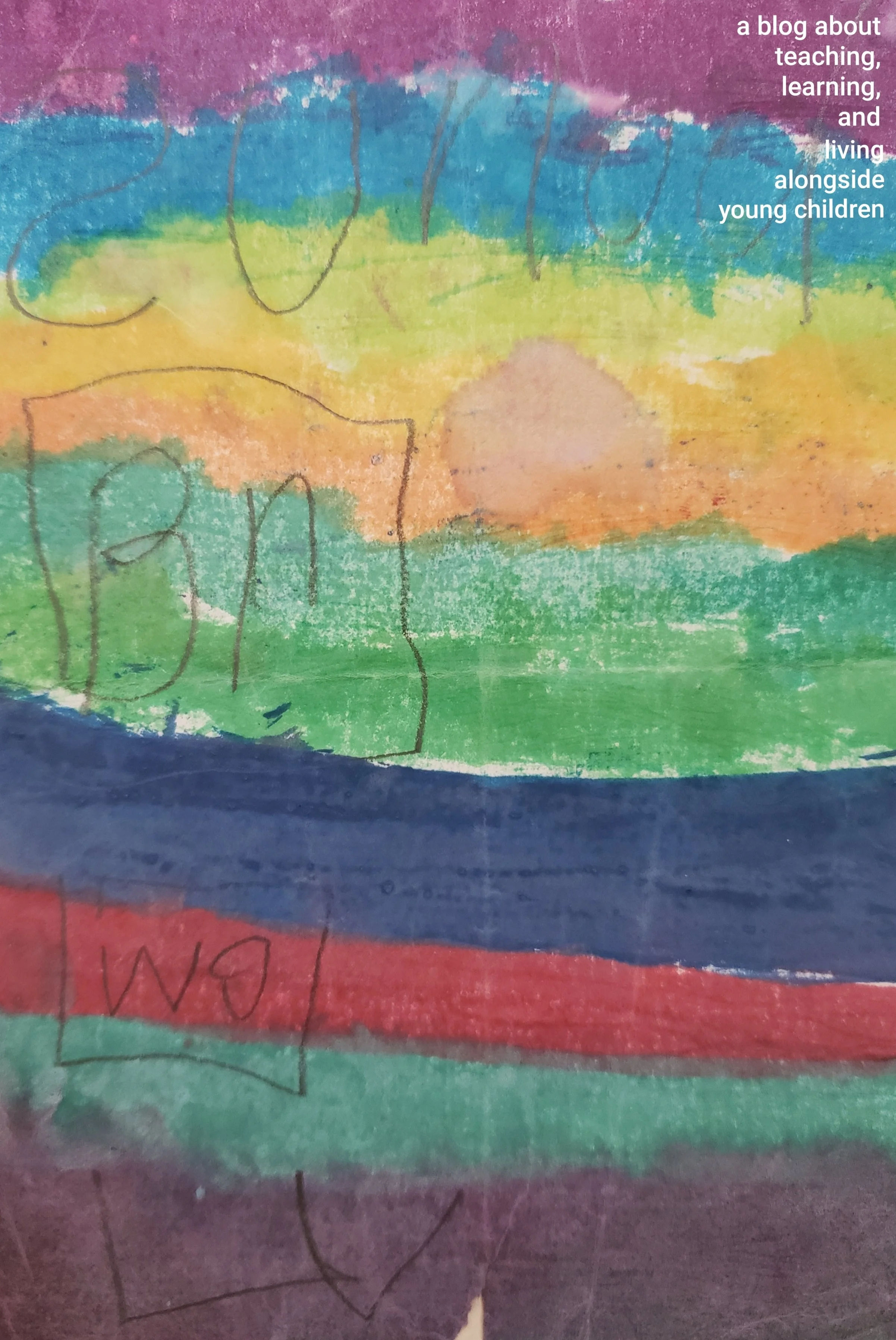Holding A Vision: The Key to Living an Intentional Life with Children
/Illustrated by Leia O., age 5
Not every moment I spend with children is great.
Not every moment children spend with me is great.
But every moment we spend together is meaningful.
Whenever I interact with a child, we learn something about how people can and do live together. This is true of all relationships; habits between partners, friends, or colleagues get entrenched or challenged depending on how we engage and respond to one another. However, the relationship we have with children is unique for many reasons, not least of which is that their brains are hardwired to make immediate, lasting connections between what they experience and how to integrate that information into future scenarios. This is particularly so for children under the age of about 6. So whatever I do, what parents do, what people and movies and images do, has a huge impact on how children see the world and their potential choices within it. We know this intuitively - it’s the reason we get so nervous about the media children are exposed to - but how do caregivers themselves act on the understanding that children draw meaning about everything from us?
It’s a big question. Not for nothing, so many of us turn to parenting and teaching books, Facebook groups, Instagram accounts…even blogs (!). The optimistic take is that these can be great resources for answering the giant existential question, “Am I the only one who feels this way?” (Spoiler alert: the answer is always no). These external resources are also a good way to find answers to whether children read by a certain age (not exactly!) or whether or not behavior conundrums can be solved definitely with a perfect, magic lecture (cough). But these are micro-issues compared with the awesome responsibility of impacting a growing person’s whole life with our own language, actions, and choices.
The real answer is the most difficult and fruitful sort of work: we have to look within ourselves. We have to reflect on who we are and what we want to become. What do I value? What do I believe about people, including myself, children, neighbors, cultures, religion, and experiences?
We must hold a vision for the kind of life and world we want to embody.
Then, we have to look within our family, teaching team, community, etc., and engage in larger dialogues - sometimes with words but mostly through actions - about how we want to live together.
The vision we hold about the world and the way we act on that vision is the defining, ever-deepening lesson we teach the children in our care.
That can be a terrifying prospect. How can I ever know that I am teaching, parenting, and living the “right” way? How can I know if this is the right way for these particular, uniquely spirited children? Yet, if we move past fear, the expanse of our vision can empower us to make the choices that are right for our families, our classes, or our communities. As Audre Lorde wrote in The Cancer Journals, “When I dare to be powerful, to use my strength in the service of my vision, then it becomes less and less important whether I am afraid.” This is worthy work. Even if the “right” choice leads us only to the next right choice, we learn to exercise the muscle of acting with care and intention. That counts.
So what does this look like? Vision is lived out in our choices, which are, of course, imperfect but meaningful messages we send to our children. When I work with children, I am constantly confronted by the echo of my values in my head: I believe justice starts with understanding one another. I believe understanding comes from listening and making connections. I believe children are capable, powerful humans with valid, expansive ideas and the inalienable right to be respected as such. That vision is easy to act on when the weather is nice, everyone has eaten breakfast, and I am in a small group of children having a compelling conversation about whether or not TV is real. I listen. I ask questions based on the assumption that children can make interesting connections on their own. I take the children seriously, even when it’s fun. My beliefs are much harder to act on when ten parent-conference forms are due, a child screams, “You are not the boss of me!” and knocks over a jar of paint, and I have had to pee for two hours. But I try. First, I pause and still myself. Then I listen. I give information that is clear and set limits that make sense according to my belief that children are capable of caring for spaces and materials, i.e. cleaning up. I take the children seriously, even when it’s not fun.
Sometimes, I fail. Sometimes, the voice of my third-grade teacher comes out of my mouth and says…something more based on the belief that adults are all-knowing. These are the times I have to recognize that part of my still-developing self, thank it for the reminder, and know I will do better next time. Even when we can’t be 100% consistent, the effort we make sends just as powerful a message. Actively working to do better and to do the next right thing that brings us closer to our vision shows children that we are all growing, just like them. What a message of solidarity, peace, and inner power. What a gift.


